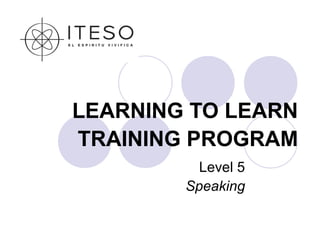
Learning to Learn Nivel 5
- 1. LEARNING TO LEARN TRAINING PROGRAM Level 5 Speaking
- 2. OBJECTIVES To help you realize the place of Speaking in the process of learning a language and the skills involved in it. To make you aware of the different strategies that may be used to practice Speaking.
- 3. Group activity Look at the following slide together as a group. Answer the questions on it. Put together a graphic representation of your answers as a group. Bar graph, pie graph, porcentages, etc.
- 4. How often do you use your spoken English in real-life situations, like: Talking to native speakers in English-speaking countries? Talking to speakers of other languages when English is the only language in common? Making phone calls to English speaking countries? Participating in on-line forums or chat-rooms? Making a speech or oral presentation in English (outside of your English class)?
- 5. suggestion 25 20 15 alumnos 10 5 0
- 6. Think about this and comment: Speaking is sometimes the ONLY evidence to others that YOU know and can use a language. When a person is competent in a language we say “he/she speaks English”. Speaking is the communication channel we use to socialize.
- 7. What are you better at? What do you need to improve? Accuracy? or Fluency?
- 8. An accurate speaker can… …use the right words. (vocabulary) …use the right tenses, prepositions, etc. (grammar) … use formal/ informal English. (style) …pronounce the sounds of English correctly. (pronunciation) …sound polite, friendly, aggressive, (intentionally).
- 9. A fluent speaker can... ...communicate a message without misunderstandings. ...respond spontaneously without hesitation or long pauses. ...smoothly start, end and even interrupt a conversation.
- 10. Attitudes Which belief do you identify with? How can beliefs and attitudes have a positive or negative effect on how you speak English? How would you benefit from a change of attitudes/beliefs? “I want my English to be perfect. I hate I no care if I make a making mistakes! In class, I want my lots of mistakes teacher to correct me every time I make when I speak –I a mistake”. know the people they understand me! I think British English is the best –I only I hate my accent! I think that want to learn that! if you try to learn English, you should try to sound like an American or an English person.! From: Ellis & Sinclair
- 11. Discuss the characteristics of the spoken language, what do you think? When we speak, we have to “think on our feet”. We don’t have much time to prepare. We can use our tone of voice, and intonation to express a message. We can also see body language and facial expression when speaking face to face. We can ask for clarification when we don’t understand something.
- 12. Discuss conversational speaking, what do you think? A conversation is a highly organized activity which requires definite skills on the part of the speakers. Learners may know the grammar and vocabulary, and still feel uncomfortable in real conversation. From:Zoltan Dornyei &Sarah Thurrell “Conversations & Dialogues in Action”
- 13. Discuss conversational rules and rituals, what do you think? In conversation, there are conventions and rules that we should have in mind. Who speaks and for how long? (turn-taking) How to start/close a conversation. How to change the topic. When to interrupt and when to hold. *convention: behavior that is considered to be correct or polite by most people in a society From: Conversation and Dialogues in Action Zoltan Dornyei & Sarah Thurrell
- 14. Activity: Turn-taking observation. How do speakers indicate their turn in a conversation? - How does a speaker give up his/her turn? By saying something like: “Well, anyway...”, “So...” or by lowering the pitch or the volume of his/her voice? By looking at someone? - How does a speaker indicate he/she is about to take up his/her turn? By using interjections: “Mm-hm”, Yeah...and, “Yes, but...” or by taking a deep breath, by interrupting the previous speaker? Try the following next time you watch your favorite TV series/sit-com in the lab.
- 15. Activity: Turn-taking observation 1. Choose one of the conversations between the characters. 2. Observe how the speakers signal their turns in the conversation. Pay attention to any simultaneous talk or overlaps between the turns as well. 3. Use the following *table to register how the speakers indicate their turns in the conversation ( You could also observe a conversation group at the lab or listen to a textbook dialogue) *For a photocopy of the table go to the binder labeled LLTP Session 5 on the shelf by the front desk. (Task-sheet 1 Turn-taking observation).
- 16. Activity: Turn-taking observation task- sheet part 1 Adapted from: Zoltan &Thurrell
- 17. Activity: Turn-taking observation task-sheet part 2
- 18. Activity: Developing Conversational Skills For more observation tasks and other activities to practice speaking, go to the binder labeled: “LLTP Session 5”. There you will find: a) More observation activities. b) Conversational strategies and language used for: - interrupting politely. - asking for information and answering that you don’t know - beginning and closing a conversation - paraphrasing and approximation (what to say when you don’t know a word)
- 19. Activity: Strategies. Try any of the following strategies. Which do you find most/least useful as ways to practice speaking? Take notes on how the ideas worked for you. Joining a conversation Talking in front of the group in school. mirror. Recording yourself Exchanging voice- speaking and later messages with an evaluating your skills. English speaking Listening to taped conversations and mouse-pal. imitating what you hear. Making friends with a Watching movies or videos native speaker. and imitating Using your English when conversational phrases. visiting an English- speaking country.